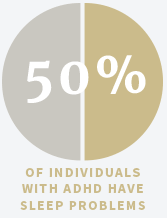Parents understand that helping their child get enough sleep is important. It affects her mood, concentration, and performance at school. Fifty percent of individuals with ADHD have sleep problems. The most common for those with inattentive ADHD is restless sleep. She may be in bed eight to ten hours a night, but low sleep quality prevents her from waking up feeling rested and ready to start her day. Kids with all types of ADHD are likely to have difficulty falling asleep. This can create myriad complications at bedtime, including arguments and frustration. Fortunately, there are a few things parents can do to help their child fall asleep and stay asleep.

4 Ways to Improve Sleep Hygiene
There are several steps that parents can take to help their daughter have a better night’s sleep. Make a habit of practicing these tips to help your daughter slow down before going to bed and train her brain for sleep.
1. DIM THE LIGHTS
Creating a darker environment seems like common sense, but you may not know the science behind it. Melatonin is a hormone that your body creates to help you fall asleep1. Melatonin production increases when the surroundings are dark. Turning down the lights 30 minutes before bedtime helps melatonin kick in and gives the body time to get sleepy before getting into bed. Higher levels of melatonin will also improve sleep quality throughout the night. In the morning, you want to do just the opposite. Open the curtains and turn on the lights so that the body knows it’s time to stop producing melatonin and start waking up. This tip should be helpful for anyone, but can be especially helpful for those already struggling to fall and stay asleep.

2. PLAY RELAXING MUSIC
Sometimes the brain needs to focus on something else to wind down. After dimming the lights, play soft, peaceful music. Allowing your daughter to take time to quietly listen and relax will help her mentally prepare for sleep.
3. POSTPONE “DEEP” CONVERSATIONS
It’s natural to bring up topics of concern or other important conversations as the day comes to an end. However, for a person with ADHD, big conversations can be too stimulating and hinder her ability to sleep. Postpone conversations that you think will upset her or get her thoughts swirling too much. Keep conversation simple and light before bed to help her fall asleep faster.

4. AVOID SCREENS
Most people have heard to avoid movies, TV, and other screens before bed. Like dimming the lights, anyone could benefit from taking a screen-break. But for your daughter with ADHD, this could be the make-or-break situation that determines whether it takes her ten minutes or four hours to fall asleep. Avoiding screens before bed will give her brain time to slow down and relax, providing her with a better opportunity for quality sleep.
What to Do When Sleep Hygiene Doesn’t Work

5. TIRE THE BRAIN
The preventative steps didn’t help? That’s okay. If she needs further help to slow her thoughts before bed, help her find a difficult, unengaging book. A history book, or something akin, is a good place to start. History is a good option because the brain needs to focus in order to understand the content of the book, yet most kids aren’t going to feel compelled to turn page after page. A book like this helps turn the many distracting thoughts running around the brain into one thought, which will make it much easier for her to fall asleep. Is your daughter a history buff, bound to be even more stimulated by the Moors overtaking Spain in 711 AD? Give her a book on math concepts, or the Iliad of Homer. Anything that requires focus, but won’t engage her, will tire the brain and help her to sleep.
6. RESET THE SLEEP CYCLE
If she’s been in bed for awhile and sleep still feels seriously far away, don’t have her stay in bed. Allow her to get up, go into a different room, and try a few tricks to fall asleep. (Now would be a good time to pull out the history book.) After a while, she can go back to bed and try falling asleep again.

7. TRY SLEEP AIDS: PRESCRIPTION, OVER-THE-COUNTER, OR NATURAL
Sometimes a sleep medication, whether prescription or over-the-counter, will be beneficial for a person with ADHD. Warm milk, a cup of tea, or essentials oils can also be effective if you’d like to try a more natural route with your daughter. Meditation is another natural, research-backed method2 to improve sleep that can be used in conjunction with other tips (such as listening to music). If noises she hears in bed keep her awake or wake her up during the night, a white noise machine can drown out those sounds and help her sleep. Any one of these sleep aids can become part of her nightly routine and improve her sleep quality.
8. LET HER SLEEP IN
Waking up can be hard, especially after a night of restless sleep. Accommodate her by allowing her sleep in a little later, when possible. In junior high and high school, the school may permit her to begin her day with second period. Even this extra hour can make a huge difference in her mood and ability to concentrate during the day.
While most everyone struggles with sleep from time to time, it’s likely that your daughter with ADHD has an especially hard time getting quality sleep. If she stays up reading under the covers for hours after you’ve asked her to put the book away, there’s a good chance it’s because she can’t fall asleep. She may prefer reading, or otherwise entertaining herself, over lying restlessly in bed. Patiently trying several different methods to help her sleep will teach her how to calm herself and ultimately make bedtime easier.
Download the 8 Ways to Improve Sleep Quality When Your Teenage Daughter Has ADHD
Download the 8 Ways to Improve Sleep Quality Infographic
We invite you to call 888.317.3958 to learn more about how our ADHD program can help your daughter with ADHD and your family.
References
1 “Melatonin.” University of Maryland Medical Center. Web. 21 June 2017. ()
2 “How Mindfulness Meditation Can Improve Your Sleep.” Time. Time. Web. 23 June 2017. ()
